google-site-verification: google85f203565cb16b4c.html
Making Better Thought-Movies One Truth At A Time
_________________________________
The Parable of the
Two Sons
The parable of the Two Sons teaches that can be a mistake to think that the initial emotional reaction to any request has much to do with the end result.
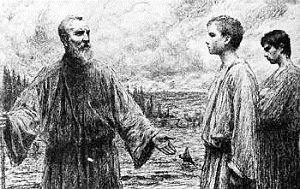
The Parable of the Two Sons:
Matthew 21.28-32
What do you think? There was a man who had two sons. He came to the first and said, Son, go and work today in the vineyard.
29 And he answered, I will not; but afterward he changed his mind and went.
30 Then the man came to the second and said the same [thing]. And he replied, I will [go], sir; but he did not go.
31 Which of the two did the will of the father? They replied, The first one. Jesus said to them, Truly I tell you, the tax collectors and the harlots will get into the kingdom of heaven before you.
32 For John came to you walking in the way of an upright man in right standing with God, and you did not believe him, but the tax collectors and the harlots did believe him; and you, even when you saw that, did not afterward change your minds and believe him [adhere to, trust in, and rely on what he told you].
What is Two Sons Parable About?
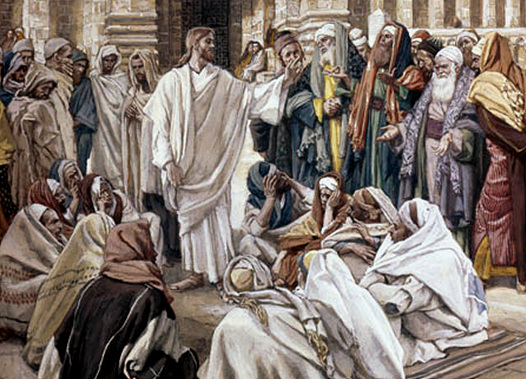
|
The Parable: There are two opposite conditions of the biblical or "spiritual heart"...
|
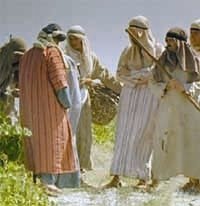 |

|
Parables are powerful "word-pictures" that are meant to be engrafted into our thinking...as mental pictures do control our thought-life. That's where the "imagination" gets involved. The imagination allows mental exploration of the past, present, future. It is the ability to see pictures and images in the "movie theater" of the mind. The imagination is the "workshop" of the human mind. It is the only thing in the world we have complete control over. That's why GOD takes great interest of what goes on there, and judges what we allow to grow there - Genesis 6.5 |

We do not know what it was that caused the son to change his mind. He may have thought the job and responsibility was too much, or beneath him. We do not know. But he did change his thinking, and went into the vineyard and did what his father had asked of him. He had a change of thinking, and Jesus said, "Which of the two did the will of his father?" There was a satisfactory ending to the father's request.
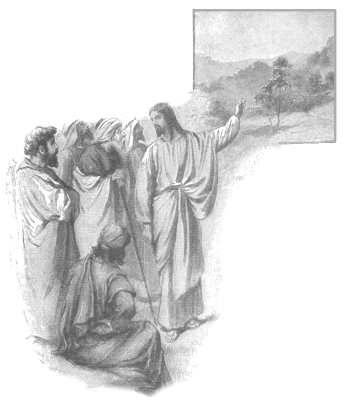 |
Two Sons - Two conditions of the "spiritual heart". The other son said, "yes" to impress and yet failed to go...
James 2.14-16 "What good is it, dear brothers and sisters, if you say you have faith but don’t show it by your actions? Can that kind of faith save anyone? 15 Suppose you see a brother or sister who has no food or clothing, 16 and you say, “Good-bye and have a good day; stay warm and eat well” but then you don’t give that person any food or clothing. "What good does that do?" |
Ecclesiastes 5.2 "Do not be quick with your mouth, do not be hasty in your heart to utter anything before God. God is in heaven and you are on earth, so let your words be few."
4-5 "When you make a vow to God, do not delay in fulfilling it. He has no
pleasure in fools; fulfil your vow. It is better not to vow than to
make a vow and not fulfil it."
The power of a vow...Jephthah
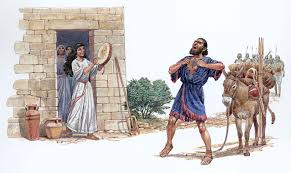
By his rash act Jephthah had made it possible that there might be a necessity for others to become involved in the fulfilment of his vow. When the battle was over and the enemy had been defeated, he returned home, having vowed that whatever first came out of his house to meet him on his return would be offered as a burnt offering to the Lord. What grief smote him when his daughter was first to greet him as she celebrated his success! She would have to pay the price for his convictions.
Let us ensure that when we determine a course of action before the Lord we carefully weigh up who will be with us in paying the price, and ensure that they are in agreement with our "vow".
Judges 11.29-40
29 "At that time the Spirit of the Lord came upon Jephthah, and he went throughout the land of Gilead and Manasseh, including Mizpah in Gilead, and from there he led an army against the Ammonites. 30 And Jephthah made a vow to the Lord. He said, “If you give me victory over the Ammonites, 31 I will give to the Lord whatever comes out of my house to meet me when I return in triumph. I will sacrifice it as a burnt offering.”
32 So Jephthah led his army against the Ammonites, and the Lord gave him victory. 33 He crushed the Ammonites, devastating about twenty towns from Aroer to an area near Minnith and as far away as Abel-keramim. In this way Israel defeated the Ammonites.
34 When Jephthah returned home to Mizpah, his daughter came out to meet him, playing on a tambourine and dancing for joy. She was his one and only child; he had no other sons or daughters. 35 When he saw her, he tore his clothes in anguish. “Oh, my daughter!” he cried out. “You have completely destroyed me! You’ve brought disaster on me! For I have made a vow to the Lord, and I cannot take it back.”
36 And she said, “Father, if you have made a vow to the Lord, you must do to me what you have vowed, for the Lord has given you a great victory over your enemies, the Ammonites. 37 But first let me do this one thing: Let me go up and roam in the hills and weep with my friends for two months, because I will die a virgin.”
38 “You may go,” Jephthah said. And he sent her away for two months. She and her friends went into the hills and wept because she would never have children. 39 When she returned home, her father kept the vow he had made, and she died a virgin.
So it has become a custom in Israel 40 for young Israelite women to go away for four days each year to lament the fate of Jephthah’s daughter."

Making Better Thought-Movies One Truth At A Time
_________________________________
Bible Study Lessons
- Abandonment
- Abilities
- Abortion
- Abuse
- Addiction
- Accusations
- Adultery
- Anger
- Apathy
- Ashamed
- Attitudes
- Backsliding
- Betrayal
- Bitterness
- Born Again
- Chance
- Conscience
- Deceit
- Deception
- Discipline
- Discretion
- Eyes of GOD
- False Witness
- Fear of the Lord
- Fear -Lord #2
- Flattery
- Friendship
- Fool, A
- Foolishness
- Forgiveness
- Giving
- Inheritance
- Injustice
- Instruction
- Judgment
- Kindness
- Knowledge
- Lawlessness
- Lies, Lying
- Misunderstand
- Pleasure
- Pride
- Problems
- Soft Answers
- Speech
- Understanding
- Vengeance
- Wisdom

Parables by Jesus
- Children of Bridechamber
- New Patch, Old Garment
- New Wine, Old Wineskins
- Treasures Old and New
- Spontaneous Growth
- Mustard Seed
- The Leaven
- Hidden Treasure
- Pearl of Great Price
- Dragnet
- The Soils
- Children at Play
- Wise and Foolish Builders
- The Wheat and the Tares
- Empty House
- Uncompleted Tower
- Rash King's Warfare
- Chief Seats
- Pharisee and Publican
- Two Debtors
- Unmerciful Servant
- Barren Fig Tree
- Bond Servant
- Unjust Steward
- Rich Fool
- Rich Man and Beggar
- Good Samaritan
- Laborers and the Hours
- Friend at Midnight
- Importunate Widow
- Lost Sheep
- Lost Coin
- Prodigal Son
- Elder Brother
- Two Sons
- Cruel Vine-Dressers
- Rejected Cornerstone
- Great Feast
- Wedding Robe
- Wise and Foolish Virgins
- Talents
- Good Shepherd